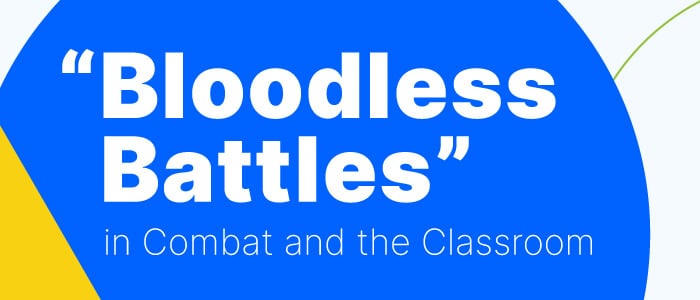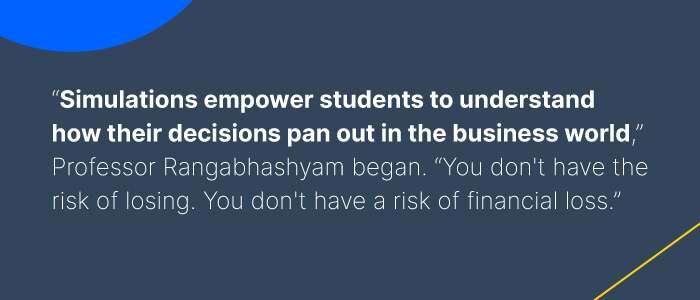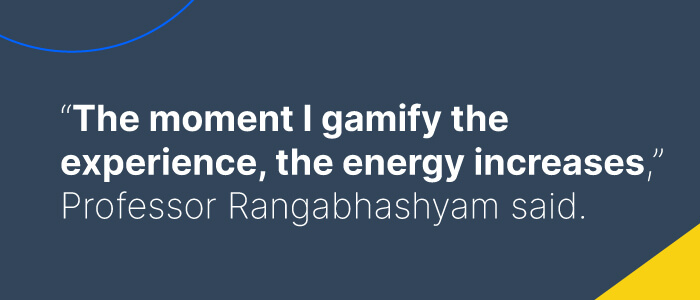"Bloodless Battles" - The Unlikely Inspiration Behind One Business Instructor's Teaching Philosophy
September 9, 2021

Former Secretary of Defense and Marine general Jim Mattis once said he wants infantry soldiers to fight “25 bloodless battles” before they ever face life-or-death combat. Mad Dog (just one of Mattis’ colorfully decorated nicknames) is hardly alone in embracing simulations for military training.
While Suman Rangabhashyam, a passionate business coach and educator in India, has been using simulations to develop business leaders for almost two decades, her introduction to simulations is extremely personal.
“I come from a defense background,” she said. “My husband was a fighter pilot in the Indian Air Force.” He used to train soldiers using combat simulations. “That’s what instigated me to adopt simulations inspiring peace in business. And Capsim was the way to go.”
Professor Rangabhashyam’s fighter pilot husband kindled her fire for simulation-based learning. Her story demonstrates the parallels between the seemingly contrasting worlds of the battlefield, the classroom, and the workplace.
Meaningful Development & Engagement: Gamification and Real-World Experience
There's no better way to learn than from failure. Especially when you can walk away with nothing more than a racing heart or a virtual scare--a bonus of mastering mission-critical goals beforehand.
For example, flight simulators enable pilots to experience how to emerge from a flock of birds and safely practice an emergency landing.
In a recent interview with Dr. Bernie Farkas, author of CapsimInbox: Business Information Systems and longtime Capsim user, shared the importance of simulation-based learning.
“Simulations are the only way you can give students the experience to nurture skills necessary to travel the course in a safe manner,” Dr. Farkas, Ph.D., Assistant Professor of Information and Technology Management at the University of Tampa, said.
“Just like Captain Sully learned how to fly through a flock of geese and land safely in the middle of the Hudson River. If he had to do that for the first time, we wouldn’t be celebrating the Captain’s success. We’d be mourning the disaster,” Dr. Farkas said.
“But because of simulations, he had enough real-life experience that he was capable of navigating through the real challenge when it came along,” he finished.
Even the military sees the value of integrating simulation-based learning into their training methodologies. In 2018, the U.S. Army awarded Bohemia Interactive Simulations (BISim), a global developer of advanced military training and simulation software, a $5 million contract to deliver virtual training technologies to soldiers.
Simulations allow soldiers and units to maximize field training by achieving learning goals beforehand. Games reduce the stress of unpreparedness in combat and explore environments not readily available to trainees.
Whether simulations are implemented in the classroom, in commercial airline pilot training, or in combat, failure is the secret ingredient to meaningful learning.
Professor Rangabhashyam recognized the need for challenging students with real-world situations to prepare them for the battles they’ll face after graduation.
And simulations provide a safe environment to do so without the high stakes.

Professor Rangabhashyam compares experiencing a simulation to earning an MBA--in a fast-track method of two days. Students may not have the capacity or financial capability to work toward an MBA, but simulations combine theory and practice into an MBA-like experience, and for a micro fraction of the cost to help remove educational barriers to entry.
Professor Rangabhashyam's approach to “gamify simulations” is intuitive, creative, and instills a healthy spirit of competition and collaboration in her students--one that mirrors life after graduation. The bonus of competition ups the stakes and excitement.

Depending upon the student’s needs or passion, Professor Rangabhashyam immerses them in Capstone 2.0--a powerful way to teach business strategy; CapsimGlobal, an international business simulation; or CapsimInbox, a vehicle that helps participants uncover soft skill gaps.
Professor Rangabhashyam takes a gamified learning method--like CapsimInbox: Escape Room and provides her 2,500+ students with two days to complete the hour-long assessment. Afterward, she encourages students to apply the teamwork, collaboration, and problem-solving skills they honed in Escape Room into a new game: FORTE--the Future of Retail Experience.
Students enter a post-COVID era, where the unknown variables introduce uncertainties into the decision-making process.
“Capsim tools and simulations are too good to be left without exploring the opportunities within,” Professor Rangabhashyam began. “It's a tool which can be further gamified.”
The Legacy of Simulations Lives On in the Family Business
Professor Rangabhashyam envisions India becoming more familiar with adopting simulations as part of its curriculum in a few years. Until then, she’ll continue teaching thousands of students with the power of immersive and engaging learning tools, a passion her husband left behind.
In 2015, Professor Rangabhashyam experienced misfortune and lost her best friend--her husband--who died of a heart attack.
“Now, I’m married to my work,” Professor Rangabhashyam said with a soft smile. “I love what I do.”
When asked if her late husband’s war background and Professor Rangabhashyam's passion for peace ever conflicted or caused a rift in their lives, she replied with a hearty chuckle, “Not at all! On the contrary, it brought us together.”
Professor Rangabhashyam has “two lovely sons.” And those two men in her life helped dig her out of the deep pit she found herself in after her husband’s passing. While her eldest son is happily married, her younger son helps with digital marketing for her simulation work. He’s her trusted business partner.
It seems like simulations are a family business. Just as Professor Rangabhashyam's husband introduced her to simulations--now she’s demonstrating the power of hands-on learning to her son. The legacy of learning through simulations lives on.
Elevate Your Real-World Teaching Experience with Immersive Simulations Today
Professor Rangabhashyam embraced simulations with a heavy heart and open arms, carrying on her husband’s legacy. But even long after he was gone, she realized the immense power of simulations to transform student experiences and connect them back to the real world -- like war and defense.
Take our business simulation or microsimulation products for a test flight to see if they could land a spot in your curriculum.

.png?width=80&name=1-questions%20(1).png)